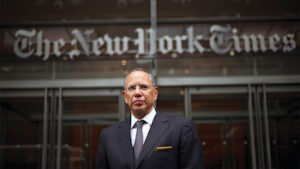
Dean Baquet
*On this date in 1956, Dean Baquet was born. He is a Black journalist and newspaper executive. Dean P. Baquet was born and raised in the Treme neighborhood in New Orleans, Louisiana. He is the son of well-known New Orleans restaurateur Edward Baquet and a prominent New Orleans Creole family member. According to colleagues, he prefers to be known as "Creole" instead of African American. Terry's brother stated, "Creole in New Orleans is Black. We're descendants of Haitians. We're Black; Creole is not a race."
Baquet graduated from St. Augustine High School in 1974. He studied English at Columbia University from 1974 to 1978; he dropped out to pursue a career in journalism. Bacquet was a reporter for The Times-Picayune of New Orleans. In 1984, he joined the Chicago Tribune, where he won the Pulitzer Prize. In 1986, Baquet married writer Dylan Landis. They have one son, Ari.
In 1988, Baquet won the Pulitzer Prize for Investigative Journalism, leading a team of reporters that included William Gaines and Ann Marie Lipinski at the Chicago Tribune, which exposed corruption in the Chicago City Council. He also received the Peter Lisagor Award for investigative reporting in 1988 and the William H. Jones Award (Chicago Tribune) for Investigative Reporting in 1987, 1988, and 1989. Baquet joined the Board of Directors of the Committee to Protect Journalists in 2003.
He joined The New York Times in April 1990 as a metropolitan desk reporter. In May 1992, he became the special projects editor for the business desk. In January 1994, he held the same title but operated out of the executive editor's office. In 2000, he joined the Los Angeles Times as managing editor, and in 2005 became the newspaper editor. As managing editor at The Los Angeles Times, Baquet was involved in the newspaper's decision to publish, a few days before the 2003 California recall election, an article raising concerns about containing "a half-dozen credible allegations by women in the movie industry" that Arnold Schwarzenegger, a front-runner in the election, had sexually harassed them. The newspaper debated whether to withhold publication until after the election, ultimately deciding not to do so.
In 2006, ABC News reported that Baquet and Los Angeles Times managing editor Douglas Frantz had decided to kill a planned Times story about NSA warrantless surveillance of Americans, acceding to a request made to him by the Director of National Intelligence John Negroponte and Director of the NSA Michael Hayden. Baquet confirmed that he had spoken with Negroponte and Hayden but said that "government pressure played no role in my decision not to run the story" and that he and Frantz had determined that "we did not have a story, that we could not figure out what was going on" based on highly technical documents submitted by a whistleblower. Baquet's decision was criticized by Glenn Greenwald, who said that Baquet had "a really disturbing history of practicing this form of journalism that is incredibly subservient to the American national security state."
Baquet was fired in 2006 after publicly opposing plans to cut newsroom jobs. In 2007, Baquet rejoined The New York Times, where he held positions as the Washington bureau chief, national editor, assistant managing editor, and managing editor. He was appointed to the managing editor position in September 2011, serving as executive editor, and promoted to executive editor on May 14, 2014. He is the first Black man to serve as executive editor. In 2015, in the aftermath of the Charlie Hebdo shooting, Baquet called Marc Cooper, a journalism professor and blogger at the University of Southern California, "an asshole" on Facebook. Cooper had criticized the New York Times for not publishing Muhammad's cartoons in the context of the Jyllands-Posten Muhammad cartoons controversy.
In the aftermath of the 2016 U.S. presidential election, Baquet explained to National Public Radio that some mainstream media outlets were too secular for their good. "I think that the New York-based and Washington-based media powerhouses don't quite get religion. We have a fabulous religion writer, but she's all alone. We don't get religion. We don't get the role of religion in people's lives. And I think we can do much, much better. And I think there are things that we can be more creative about to understand the country." Baquet later characterized an article in which the New York Times public editor questioned whether the Times' prior coverage of President Trump's possible Russia ties had been unnecessarily and overly cautious as a "bad column" that comes to a "fairly ridiculous conclusion". In an interview after the Mueller report, Baquet said: "We wrote a lot about Russia, and I have no regrets. It’s not our job to determine whether or not there was illegality."
In 2017, Baquet defended the decision to publish confidential photos from that year's Manchester Arena bombing investigation shared by U.K. intelligence and law enforcement with their US counterparts. In response, the U.K. restricted intelligence sharing with the U.S. In May 2019, in defense of WikiLeaks founder Julian Assange, Baquet said, "Obtaining and publishing information that the government would prefer to keep secret is vital to journalism and democracy. The new indictment is a deeply troubling step”. Baquet was awarded the Larry Foster Award for Integrity in Public Communication at the 2019 Arthur W. Page Center Awards.